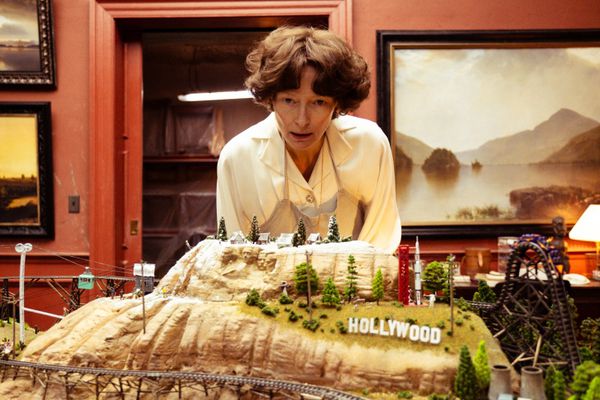Eye For Film >> Movies >> The End (2024) Film Review
The End
Reviewed by: Amber Wilkinson

Where to begin with The End? It’s such an odd concoction of ideas and styles, it’s hard to know. The concept of bringing unlikely things together has, of course, worked for Joshua Oppenheimer in the past. Asking genocidal mass killers to re-enact their crimes for a documentary is not something most people would have hit upon but the director made it viscerally pay-off with The Act Of Killing.
This time around, however, while his audacity remains, his delivery falls short. Set in a dystopian future, the action takes place in a scraped out bunker, filled with dunes of salt. Walk through a door, though, and you’re suddenly in what appears to be a tasteful upper middle-class home, lined with art masterpieces from the likes of Renoir with not a speck of dirt to be seen. This is where, what we assume to be one of the world’s last families, lives. A petrochemical magnate (Michael Shannon), his wife (Tilda Swinton) and their oddly arrested development son (George Mackay), along with a doctor (Lennie James), a housekeeper-cum-friend (Bronagh Gallagher) and an additional male lackey (Tim McInnery).
They might as well be living in a home called Chez Allegory, so carefully constructed is each individual to make sure they’re the perfect example of various sorts of denial. “Subtle is worse,” the mother tells her son mid-conversation, “You're always trying to find it again.” Oppenheimer and his co-writer Rasmus Heisterberg seem to take this line as a direct instruction, ensuring that all subtlety is removed from this film’s themes as meticulously as the family clean out the dust. This is a lesson by brickbat.
The music, composed by Josh Schmidt and Marius de Vries, proves to be as strained as the family relationships. There’s nothing subtle about the use of autotune on members of a cast who were not born for musical theatre. Swinton, in particular, has the electronics tuned up so far that if it went any further, she’d be in Sparky’s Magic Piano territory. The songs are used in that smattering way that modern musicals often go for, cropping up just in time to break whatever mood has been created. These are supposed to reveal - in a sort of pastiche of the showtune end of Great American Songbook - the inner thoughts of the characters, but given that they’re all as predictable as the idea of human beings bringing about our own demise, there’s a lack of surprise.
The plot, such as it is, beyond the question of whether the family will recognise the monsters they are, is driven by the arrival of a young Black woman (Moses Ingram, the only member of the cast with real musical chops) and what the family, and she, might do next. The focus, in particular, falls on Mackay’s young man, who has never known a life outside these walls and relies on his father’s revisionist history, from which the older man emerges as a saviour type cruelly hit by events rather than his own actions. There is no consideration of racial tensions or even relationships by Oppenheimer, which seems a particularly odd choice given the state of the modern world which it is intending to reflect upon. Reflection is generally in short supply, as Oppenheimer seems stuck in a sort of doom loop, showing us repeatedly how egregious these people are - and how contagious that might be to others - without exploring the themes much beyond that.
It’s ironic that a film about a family who have built a perfect facsimile of a life for themselves should feel so overly constructed itself. When Mackay springs about the place during a musical number, he ends up at just the right angle to be caught in a perfect frame of light, even though it makes no sense at all that he would be singing away, or even able to do so, as salt pours down on him from above. Characters also appear at just the right moment to offer up their line of a song - something that is forgivable on stage, or even in a full blown musical but here just feels forced. Equally, the libretto is weak, containing lines such as: “The sky, the sea, a bird on a tree.” While this is no doubt intended to reflect the shallowness of character some of the time, there are better ways to achieve that. Someone should, perhaps subtly, suggest that Oppenheimer watches more Sondheim.
Beyond the singing, this is a hugely talented cast who deliver the emotional beats when they get the chance, with gradual breakdown of a festive meal a particular highlight. If the music had been jettisoned completely, it would leave more room for them to deliver the allegorical goods but as it is the non-hits keep on coming. In the end, nothing can stave off the feeling that though this might look different from a distance, on closer inspection this has all been done before and better elsewhere.
Reviewed on: 24 Sep 2024















